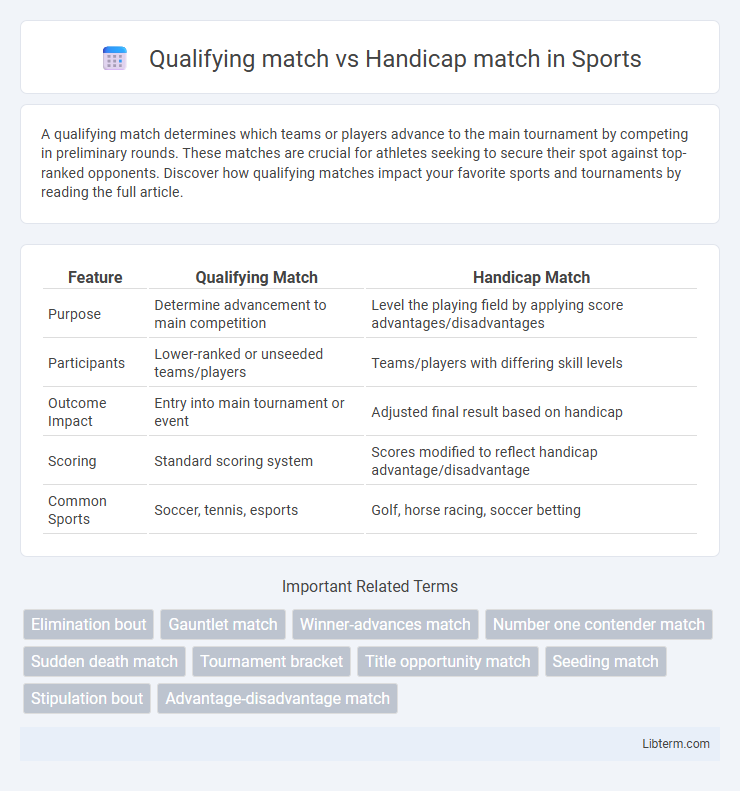A qualifying match determines which teams or players advance to the main tournament by competing in preliminary rounds. These matches are crucial for athletes seeking to secure their spot against top-ranked opponents. Discover how qualifying matches impact your favorite sports and tournaments by reading the full article.
Table of Comparison
| Feature | Qualifying Match | Handicap Match |
|---|---|---|
| Purpose | Determine advancement to main competition | Level the playing field by applying score advantages/disadvantages |
| Participants | Lower-ranked or unseeded teams/players | Teams/players with differing skill levels |
| Outcome Impact | Entry into main tournament or event | Adjusted final result based on handicap |
| Scoring | Standard scoring system | Scores modified to reflect handicap advantage/disadvantage |
| Common Sports | Soccer, tennis, esports | Golf, horse racing, soccer betting |
Understanding Qualifying Matches vs Handicap Matches
Qualifying matches determine eligibility for main tournaments, requiring players to win multiple rounds to secure a spot, often impacting rankings and prize money opportunities. Handicap matches involve assigning different starting advantages or disadvantages to competitors based on skill level, aiming to balance competition and create fairer outcomes. Understanding these formats is crucial for betting strategies, as qualifying matches reflect player form and consistency, whereas handicap matches focus on levelled competition dynamics.
Key Differences Between Qualifying and Handicap Matches
Qualifying matches determine player eligibility or advancement in tournaments by requiring winners to secure a specific rank or score, shaping the competition's structure. Handicap matches, however, balance skill disparities by assigning score advantages or disadvantages to competitors, promoting fair play across varying abilities. The core difference lies in qualifying matches emphasizing progression criteria, while handicap matches emphasize skill equalization.
Rules and Structure: Qualifying Match Explained
A qualifying match determines which players advance from preliminary rounds to the main competition, often featuring knockout rules with strict score requirements for progression. In contrast, a handicap match adjusts player starting conditions to level skill disparities, using point advantages or disadvantages based on players' rankings. Qualifying matches focus on pure performance and elimination, while handicap matches emphasize balanced competition through rule adaptations.
Rules and Structure: Handicap Match Explained
A handicap match in gaming or sports involves one competitor receiving a performance advantage or disadvantage to balance skill levels and ensure fairness, unlike a qualifying match, which determines eligibility for subsequent competition rounds. The primary rule of a handicap match is to assign extra points, time, or other benefits to the weaker player or team, creating an equal opportunity to win despite skill disparities. This structure contrasts with qualifying matches where no such adjustments occur, as the main objective is to identify the best performers under uniform conditions.
Objectives and Stakes in Qualifying Matches
Qualifying matches aim to determine eligibility for the main event or tournament, with players or teams competing to secure advancement and earn ranking points. The stakes in qualifying matches often include gaining entry, improving seed positions, and accumulating prize money that can impact future opportunities. Handicap matches focus on leveling the playing field by assigning advantages or disadvantages based on skill, making the competition more balanced rather than serving as a filter for progression.
Objectives and Stakes in Handicap Matches
Handicap matches aim to balance the competition by assigning advantages or disadvantages to players or teams based on their skill levels, creating a more equitable contest and enhancing betting appeal. The primary objective in handicap matches is to offset disparities, ensuring a competitive environment where the underdog has a stake and the favorite faces a challenge. Stakes in handicap matches revolve around strategic betting and skillful play, where outcomes are influenced not just by performance but also by the assigned handicap, increasing engagement and analysis for participants and bettors.
Historical Examples: Famous Qualifying Matches
Qualifying matches have historically determined entry into prestigious tournaments, like the 1990 Wimbledon qualifier where Tim Henman advanced to become a prominent player. These matches often feature rising stars battling for limited main draw spots, showcasing intense competition unseen in regular tournament rounds. Handicap matches differ by leveling playing fields through score or advantage adjustments, rarely impacting tournament qualifications but more common in casual or exhibition settings.
Notable Handicap Matches in Wrestling History
Notable handicap matches in wrestling history showcase unique dynamics, such as the 1995 Survivor Series where The British Bulldog battled multiple wrestlers alone, highlighting endurance and strategy under uneven conditions. Another iconic instance is the 1988 King of the Ring, featuring Ted DiBiase taking on multiple opponents, emphasizing skill and psychology in overcoming numerical disadvantages. These matches remain memorable for their dramatic storytelling and the extraordinary talent displayed against the odds.
Impact on Competitors: Qualifying vs Handicap
Qualifying matches rigorously filter competitors based on skill and performance, ensuring only the most capable advance, which intensifies competitive pressure and heightens motivation to excel. Handicap matches balance disparities by assigning advantages or disadvantages, allowing lesser-skilled players to compete more evenly with stronger opponents, fostering inclusivity and strategic adaptation. The impact on competitors differs as qualifying emphasizes meritocratic progression, while handicap systems promote parity and opportunity for diverse skill levels.
Audience Appeal: Which Match Type Reigns Supreme?
Handicap matches attract a broader audience by leveling the playing field, creating unpredictable outcomes that heighten excitement and viewer engagement. Qualifying matches appeal to hardcore fans who appreciate skill-based competition and the progression narrative, emphasizing merit over advantage. Ultimately, handicap matches tend to reign supreme in audience appeal due to their suspenseful nature and accessibility for casual viewers.
Qualifying match Infographic

 libterm.com
libterm.com